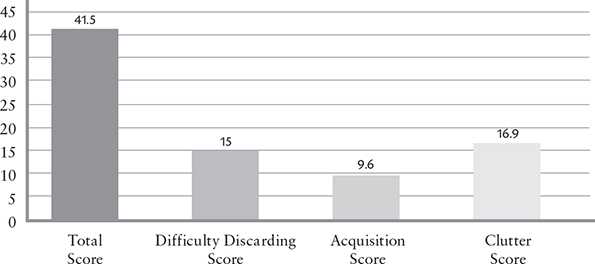Lose the Clutter, Lose the Weight (13 page)
Read Lose the Clutter, Lose the Weight Online
Authors: Peter Walsh

During the past week:
| 0 | 1 | 2 | 3 | 4 |
| Not at all | Mild | Moderate | Considerable/severe | Extreme |
| 12. To what extent does clutter in your home cause you distress? |
| 13. How strong is your urge to save something you know you may never use? |
| 14. How upset or distressed do you feel about your acquiring habits? |
| 15. To what extent do you feel unable to control the clutter in your home? |
| 16. To what extent has your saving or compulsive buying resulted in financial difficulties for you? |
For each of these questions, circle the number that corresponds most closely to your experience during the past week.
| 0 | 1 | 2 | 3 | 4 |
| Not at all | Mild | Moderate | Considerable/severe | Extreme |
| 17. How often do you avoid trying to discard possessions because it is too stressful or time-consuming? |
| 18. How often do you feel compelled to acquire something you see (e.g., when shopping or offered free things)? |
| 19. How often do you decide to keep things you do not need and have little space for? |
| 20. How frequently does clutter in your home prevent you from inviting people to visit? |
| 21. How often do you actually buy (or acquire for free) things for which you have no immediate use or need? |
| 22. To what extent does the clutter in your home prevent you from using parts of your home for their intended purpose? For example, cooking, using furniture, washing dishes, cleaning, etc. |
| 23. How often are you unable to discard a possession you would like to get rid of? |
Scoring:
To find your score, first add up your answers to questions 1, 3, 5, 8, 10, 12, 15, 20, and 22. These questions make up the clutter component of this questionnaire. This score will give you a sense of how much trouble the physical clutter around your home is now causing you.
My clutter score = ______
Next, add up your answers to questions 4 (reversed), 6, 7, 13, 17, 19, and 23.
Be sure to reverse your score for question 4 because of the way it's written. For example, if you circled 0, switch it to 4, and vice versa. If you circled 1, switch it to 3, and vice versa. If you circled 2, it remains the same.
This score measures how intensely you feel the need to save objects, or the intensity of the difficulty you have discarding them.
My difficulty discarding/saving score = ______
Finally, add up your answers to questions 2 (reversed), 9, 11, 14, 16, 18, and 21.
Again, make sure to reverse your score for question 2.
This score measures your need to buy new items or get them for free, as well as how your desire to acquire has affected your life.
My acquisition score = ______
Now add all these scores together to get your total score.
My total score = ______
If you gave this questionnaire to a general crowd of people, on average their scores would be:
 Clutterâ8.1
Clutterâ8.1
 Difficulty discarding/savingâ7.8
Difficulty discarding/savingâ7.8
 Acquisitionâ8.1
Acquisitionâ8.1
 Total scoreâ24
Total scoreâ24
On the other hand, if you gave these questions to people with hoarding problems, their scores would likely be:
 Clutterâmore than 17
Clutterâmore than 17
 Difficulty discarding/savingâmore than 14
Difficulty discarding/savingâmore than 14
 Acquisitionâmore than 9
Acquisitionâmore than 9
 Total scoreâmore than 40
Total scoreâmore than 40
When we gathered our test panel, we asked them to take this survey, and I suspected their scores would be high. Much to my surprise, however, their average clutter, difficulty discarding, and aquisition scores were in the hoarding range, or just below it.
 TEST PANEL SAVING INVENTORY
TEST PANEL SAVING INVENTORY
BEFORE

